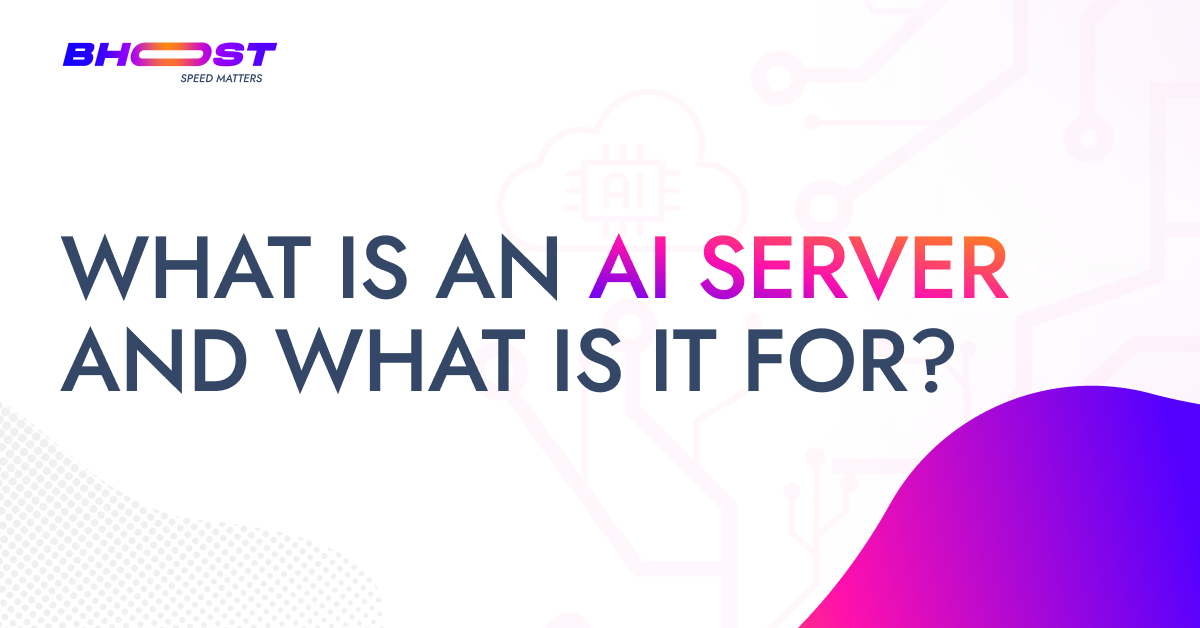Developments in artificial intelligence are opening up new opportunities in various sectors, such as medicine, industrial automation, data analytics and marketing, and e-commerce. To support the processing of complex algorithms and machine learning, servers specifically designed for artificial intelligence are needed.
Artificial intelligence: a brief introduction
Artificial intelligence is a field of computer science that deals with creating systems and machines capable of performing tasks that require human intelligence. These systems can analyze data, learn from it and make autonomous decisions. AI can be divided into several categories, including machine learning, computer vision, natural language recognition and robotics.
Uses of artificial intelligence
Artificial intelligence finds application in numerous sectors and offers multiple benefits. Here are some examples of uses of artificial intelligence:
- Medicine: AI can help in medical diagnosis, analysis of medical images, discovery of new drugs, and management of healthcare data.
- Industrial automation: Artificial intelligence can improve the efficiency of industrial operations, optimize production and prevent failures and accidents.
- Data analysis: Artificial intelligence allows large amounts of data to be analyzed quickly and efficiently, helping companies make more informed decisions and spot hidden patterns.
- Virtual assistance: Artificial intelligence systems, such as virtual assistants, can answer user questions, provide information and perform specific tasks.
- Marketing: AI can help with brand communication, SEO performance, value addition in the funnel stages, and content creation.
However, the use of AI requires specially designed servers that are capable of managing intensive and complex workloads. So let’s see what the characteristics of artificial intelligence servers are.
Server for AI: what you need to know
In the context of the development of AI, dedicated servers play a fundamental role. In fact, these are designed to manage the intensive and complex workloads required by AI algorithm processing and machine learning.
But let’s see some of the main considerations to keep in mind when choosing a server for AI:
- Computing power: AI servers must be equipped with high computing power to handle complex algorithms and intensive workloads. High-performance multi-core processors, such as GPU and TPU processors, are often used to accelerate computing operations.
- Memory and storage: Processing AI models require a large amount of memory and storage space. AI servers must therefore be equipped with an adequate amount of RAM and high-speed hard drives or SSDs.
- High-performance networking: Communication between servers and data management requires a high-speed, low-latency network. The use of high-performance network interfaces, such as 10GbE or 25GbE connections, ensures reliable data transmission.
- Cooling system: AI servers generate significant heat due to intense computing activity. Therefore, it is essential that servers are equipped with an adequate cooling system, such as fans and heat sinks, to avoid overheating.
- Scalability: The ability to scale horizontally or vertically is important to adapt to AI processing needs. The ability to flexibly add or remove compute resources helps you manage evolving workloads.
To summarize, an artificial intelligence server is designed to provide the computing power, memory, networking, and scalability required to support advanced AI applications. Choosing a server suited to your specific AI needs is critical to achieving optimal performance and maximizing the potential of your AI applications.
Bhoost can offer you dedicated and AI-optimized hosting solutions capable of guaranteeing high performance and optimal security levels. Contact us for further information.
GPU server for artificial intelligence
The GPU server plays a key role in the development and processing of artificial intelligence. The GPU (Graphics Processing Unit) is a specialized device designed to accelerate parallel computing, making it particularly suitable for processing complex algorithms used in AI.
GPUs are made up of a large number of computing cores working simultaneously to perform operations in parallel. This parallel architecture allows you to perform compute-intensive tasks much faster than traditional processors.
In artificial intelligence, GPUs are often used to accelerate machine learning, especially the training of deep neural networks. Deep neural networks require a huge amount of computation, such as matrix multiplication and applying activation functions. GPUs can perform these operations in parallel on large amounts of data, significantly speeding up the training of AI models.
Using GPU servers for AI offers numerous benefits, including:
- High performance: GPUs are capable of performing intensive calculations much faster than traditional processors, allowing for a dramatic increase in the performance of AI processing.
- Scalability: Using GPU servers allows you to easily scale computing resources to handle evolving workloads.
- Energy efficiency: GPUs are designed to be more power efficient than traditional processors, allowing you to achieve high performance with relatively little power consumption.
Importantly, not all AI workloads benefit from GPUs. Some algorithms and applications may require greater computational flexibility or a greater ability to handle large amounts of data sequentially. In these cases, other processing options, such as servers with traditional multi-core processors or servers with tensor processing units (TPU), may be preferable.
In summary, GPU servers are a powerful, high-performance solution for AI computing. Thanks to their high parallel computing power, they can accelerate machine learning and other artificial intelligence applications, enabling higher performance and reduced processing times.
AI server energy consumption considerations
Considerations on the energy consumption of AI servers are crucial in the current context of energy efficiency and sustainability. Given the high demands on computing power and long processing sessions typical of artificial intelligence, AI servers can consume a significant amount of energy and contribute to greenhouse gas emissions.

To face this challenge, some strategies can be adopted:
- Algorithm optimization: Optimizing AI algorithms to reduce processing time and the amount of calculations required can help reduce energy consumption. Reducing algorithm complexity and resource usage can lead to a better balance between performance and power consumption.
- Energy-efficient hardware: Using power-efficient hardware like low-power processors or specialized accelerators (e.g., TPUs) can reduce AI server power consumption. These components are designed to offer high performance with lower power consumption compared to more generic solutions.
- Efficient cooling: Implementing efficient cooling solutions can reduce overall system energy consumption. Optimized cooling systems reduce the energy needed to cool servers.
- Virtualization and consolidation: Using virtualization technologies can allow you to consolidate more workloads onto fewer physical servers. This can reduce overall energy consumption, as more efficiently used servers require less energy to operate.
- Energy monitoring and management: Monitor energy use and optimize power settings to reduce consumption.
Additionally, organizations can consider adopting renewable energy to power their servers for AI.
Bhoost has always cared about the environment and that’s why all the servers are 100% sustainable.
Using clean energy sources, such as solar or wind power, can help reduce the overall environmental impact of AI computing.
It is critical to carefully consider the energy efficiency of AI servers in order to reduce operational costs as well as the environmental impact of AI applications. Sustainability and energy efficiency must be considered as key elements in the design and use of AI servers.
Why is it important for security to have your own dedicated server for AI?
It is essential to have your own AI server to ensure the security of your data. When working with artificial intelligence, the data used to train models may contain sensitive or proprietary information. Relying on a shared server or cloud computing services may pose security risks, such as the possibility of unauthorized access or data breaches.
By having your own AI server, you can implement customized security measures to protect sensitive data. This includes adopting advanced security protocols, such as two-factor authentication, encryption of data in transit and at rest, as well as access rights management to ensure that only authorized individuals can access data.
Furthermore, with a proprietary AI server, you have more control over data management. You can establish data retention policies, and decide where it is stored and how it is used. This offers a higher level of security and privacy than shared or cloud-based solutions, where data can be managed by third parties.
Another crucial aspect is regulatory compliance. Having a dedicated AI server allows you to adhere to regulations and security requirements specific to your industry. This is especially important in highly regulated industries such as healthcare, finance or government, where data protection is of paramount importance.
Finally, a proprietary AI server offers the ability to carry out regular security audits and monitoring to detect any vulnerabilities or intrusions. In the event of a security incident, you can intervene quickly and take the necessary measures to protect your data and mitigate negative effects.
In summary, owning a dedicated AI server offers greater control, security, and privacy for the data used in AI. This is especially important when working with sensitive or proprietary data. Investing in a proprietary AI server can be a great solution to ensure data security and adhere to industry regulations.
In conclusion
Artificial intelligence is transforming the way we operate in numerous industries, from medicine to marketing to content writing. AI servers play a crucial role in this revolution, providing the computing power, memory and scalability needed to support advanced AI applications.
To achieve optimal performance for your AI applications, it is crucial to choose the right server, whether you opt for GPU servers or tensor processing unit servers. Additionally, security, energy efficiency, and sustainability are key considerations when configuring and using AI servers. As artificial intelligence continues to expand, the importance of AI servers will continue to grow in the future.
If you need an AI server, contact us and we will find the best solution suitable to your needs.
That’s it, folks! For more information, check out our blog.

Free 30-days trial Hosting Fast, Secure and Optimized
Switch to Bhoost with 30 days free and migration included
Free 30-days trial


